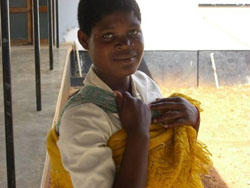You are here » Home » Telling Our Story
Success Story
Communities, hospitals
streamline efforts to aid mothers during delivery
Coordinating for Safer Pregnancies

Photo: Chevenee Reavis/Mgmt Services
Mary Na Mbewe, who came to the hospital for a postnatal checkup for herself and her
newborn, said, "I come to the hospital to make sure we are both okay"
By coordinating and improving maternal health services, Kasungu District Hospital has seen a dramatic reduction in maternal mortality, from 52 maternal deaths in 2005 to 29 in 2006.
Maternal mortality rates in Malawi are among the highest in southern Africa: 1 in 100 pregnant women are likely to die from complications of pregnancy, either during delivery or shortly after.
A USAID-supported implementing partner helped the district health management team to conduct maternal death audits, which revealed many challenges. In some instances, women arriving by ambulance stayed in the vehicle for nearly an hour before receiving attention. Such events generated negative perceptions of medical staff and discouraged women from going to hospital. Instead, they visited traditional birth attendants with no training or equipment to manage complicated births. When complications arose, reaching facilities for timely emergency care was often difficult, and many women died.
The implementing partner helped the management teams strengthen emergency referrals by installing or repairing 18 radios, developing local transport policies guiding ambulance deployment and training ambulance drivers in emergency triage and customer service, thus decreasing waiting times for women in labor. The teams held discussions with traditional authorities and birth attendants to promote delivery at sanctioned health facilities and to help them recognize early danger signs.
Birth attendants in remote areas have partnered with hospital staff to ensure prompt referrals of women to hospital. They have also been trained in infection prevention and record keeping to help monitor the number of women giving birth in the communities. To improve attitudes towards hospitals, a local partner organization has trained volunteers to greet women on arrival and escort them to the maternity ward.
Before the intervention, maternal mortality in the Kasungu District was especially high, with women often dying during childbirth or arriving at the hospital too late to be saved. With the strengthening of emergency referral services, a renewed commitment to customer satisfaction and formal partnerships with local communities, Kasungu District Hospital has seen a dramatic reduction in maternal mortality, from 52 maternal deaths in 2005 to 29 in 2006.
Print-friendly version of this page (533kb - PDF)
Click here for high-res photo
Back to Top ^ | 

